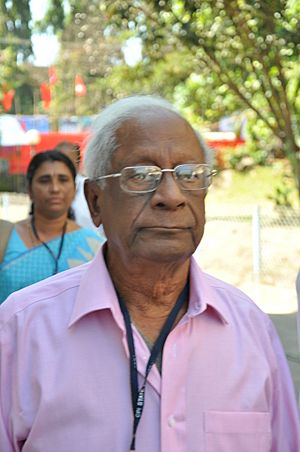A. B. Bardhan facts for kids
Quick facts for kids
A. B. Bardhan
|
|
|---|---|
 |
|
| General Secretary of the Communist Party of India | |
| In office 1996–2012 |
|
| Preceded by | Indrajit Gupta |
| Succeeded by | Suravaram Sudhakar Reddy |
| Member of the Bombay Legislative Assembly | |
| In office 1957–1962 |
|
| Preceded by | Post established |
| Succeeded by | Sushila Balraj |
| Constituency | Nagpur |
| Personal details | |
| Born | 25 September 1924 Barisal, Bengal Presidency, British India (now Bangladesh) |
| Died | 2 January 2016 (aged 91) Delhi, India |
| Nationality | Indian |
| Political party | Communist Party of India |
| Spouse | Padma |
| Alma mater | Nagpur University |
| Profession | Politician, social worker |
Ardhendu Bhushan Bardhan (born September 24, 1924 – died January 2, 2016) was an important Indian leader. He was known for leading groups that supported workers' rights. He also served as the top leader, called the General Secretary, of the Communist Party of India (CPI). This is one of the oldest political parties in India.
Contents
Early Life and Education
A. B. Bardhan was born in a place called Barisal. This area was part of British India at the time. Today, it is in Bangladesh.
When he was 15, he moved to Nagpur and became interested in Communism. In 1940, he joined the All India Students Federation. This was a group for students at Nagpur University. He also joined the Communist Party of India that same year. The party was not allowed to operate openly back then.
Bardhan became the President of the Nagpur University Students' Union. He worked full-time to organize students while he was still studying. In 1945, he was chosen as the Secretary of the All India Students Federation. He earned degrees in both economics and law.
Working for People and Politics
Bardhan worked with many different kinds of workers. These included people in textile factories, electricity, railways, and defense. He tried to get elected to government many times from Nagpur. He was elected only once, in 1957, to the Maharashtra Legislative Assembly. He ran as an independent candidate, meaning he was not part of a major party.
He also helped create the state of Maharashtra on May 1, 1960.
Later, Bardhan moved to Delhi to work in national politics. In 1994, he became the General Secretary of the All India Trade Union Congress. This is a large group that helps workers. In 1995, he became the Deputy General Secretary of the Communist Party of India.
When Indrajit Gupta, the previous General Secretary, joined the government, Bardhan took his place. Bardhan was the General Secretary of the Communist Party of India from 1996 to 2012.
He is remembered for starting a campaign against a political march led by L. K. Advani. Bardhan always believed in a secular India. This means a country where the government treats all religions equally.
Bardhan also played a big part in forming the United Progressive Alliance government. His party, the Communist Party of India, supported this government. He also supported Pratibha Patil to become the President of India.
Personal Life
Bardhan was married to Padma. She was a teacher in Nagpur. They had a son named Ashok and a daughter named Alka Barua. Padma passed away in 1986. After her death, Bardhan lived in a small room at Ajoy Bhavan. This is the main office of the Communist Party of India in Delhi.
Bardhan could speak many languages very well. These included Marathi, Bengali, Urdu, Hindi, and English languages. He had a very close friendship with Sumatitai Sukaklikar. She was a leader from a different political party in Nagpur. Even though they ran against each other in elections, they were like brother and sister.
His Passing
In December 2015, Bardhan had a paralytic stroke. He was taken to the hospital. He passed away on January 2, 2016, at the age of 91. He died at the Govind Ballabh Pant Hospital in New Delhi.
Many important people shared their sadness about his death. These included the President of India Pranab Mukherjee, the Prime Minister of India Narendra Modi, and Congress President Sonia Gandhi.
Works
A.B. Bardhan wrote many books. Some of them are:
- Debate on reservation
- Class, Caste Reservation & Struggle Against Casteism
- 80 CPI
- Generalists, specialists and the working class
- The tribal problem in India
- India's Freedom Struggle: Several Streams
- Hutatma Bhagat Singh
- Prejudices & myths that feed communalism x-rayed
- Reforms 2020: Last 20 Years, Next 20 Years
See Also
 In Spanish: Ardhendu Bhushan Bardhan para niños
In Spanish: Ardhendu Bhushan Bardhan para niños
 | Aaron Henry |
 | T. R. M. Howard |
 | Jesse Jackson |

